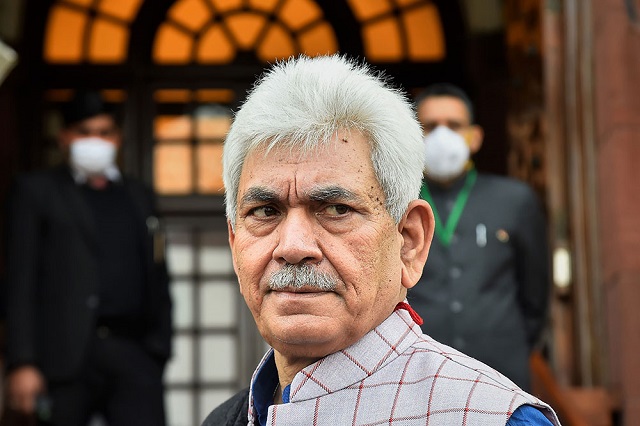After abrogating Article 370, the next step was to restore normalcy in Kashmir but three years hence that is still a far cry
by Ashok K Mehta
Three years after reading down Article 370 of the constitution the government has not achieved its stated objectives of eradicating terrorism from J&K, winning the hearts and minds of the Kashmiris, integrating Kashmir with the mainstream, and ushering in development. Internationalizing the Kashmir issue has not isolated Pakistan diplomatically. Instead, China has been brought into the bilateral issue. GoI cannot wish away issues that have festered for 75 years. The book Hamin Ast ?, a biography of Article 370, published by the Vidhi Centre for Legal Policy has argued that nullification of Article 370 is legally unsound. The matter is languishing in Supreme Court and though Chief Justice Ramanna indicated it will be listed shortly, the petitioners are not hopeful – such is the political climate in the country.
 |
| Manoj Sinha, Lieutenant Governor of Jammu and Kashmir. PTI Photo/Kamal Singh |
The Forum for Human Rights, in its annual report, Three Years as Union Territory: Human Rights in J&K (August 2021-July2022) has documented the basic infirmities and unabated gross human rights violations. Although it has not had any effect on state policy, it had noted the abnormalities in J&K.
Last Friday, China said that India and Pakistan peacefully resolve their differences on the third anniversary of revoking the special status of J&K . It reiterated its call to parties to avoid taking unilateral actions to change the status quo or escalate tension. In 2019, China was incensed by the new map of the Union Territory of Ladakh and Home Minister Amit Shah’s boast in Parliament of taking back Aksai Chin. China was not satisfied by Foreign Minister S Jaishankar’s plea that it will have no bearing on the boundary dispute and he even traveled to Beijing to placate the Chinese. PLA aggression in Ladakh opened a second active front in May 2020 and it is now constructing a new road, G695 parallel to the existing G219 from Xinjiang to Tibet, 20 to 25 km from the border. India has lost some 1000 km of territory to China by its threat to reclaim Aksai Chin and the reorganization of the J&K Act. Initially jubilant. The Ladakhis are disappointed as under Union Territory status, they are governed by bureaucrats and not their people. Corruption has crept in and central laws are applicable with no administrative accountability.
Security has been a top priority. The strength of security forces in the hinterland has almost doubled since 2019. The situation is ‘almost normal’ going by statistics. But by no stretch of the imagination has terrorism been eliminated. When asked in Srinagar recently, Defence Minister Rajnath Singh said: “It is an old problem and will take time to be eradicated”. Of the 690 militants killed since 2019, 135 have been eliminated this year. In addition 136 civilians, 146 security forces, and 57 state officials have also lost their lives. More significantly, while the administration calls militancy Pakistan’s proxy war, it has changed tactics. Militancy goes by different names like hybrid terrorism, and faceless militancy… anonymity is key and the new recruit – 572 joined since 2019 – is put to use immediately in distant and random acts like hurling grenades, etc. Many of these are lone wolf acts. Targeted killings of Hindus, Pandits, and migrants have kept the fear of guns alive.
There is no denying that the security situation has improved significantly – no stone pelting, few calls for hartals, no overground worker networks, and top commanders eliminated. This has been achieved by the drastic use of PSA, UAPA, and tax raids. This year alone, NIA carried out 83 raids so far. Dead bodies of terrorists continue not to be returned to families, pandits are in lockdown and do not go to work. Similarly, ‘panches’ are confined to their homes, Mirwaiz Omar Farooq remains under house arrest, Farooq and Omar Abdullah, and Mehbooba Mufti say they are under house arrest, and all party meetings are not permitted. Though militancy has spilled over to Chenab and Pir Panjal valleys the Multi-Agency Terror Monitoring Group has done well though new challenges could materialize after Al Jawahiri’s killing in Kabul and the activation of Al Qaeda and ISIS sleeper cells in the region. The Resistance Front, consisting of jihadis from Jaish e Mohammad is picking up courage and strength.
In the fourth year of the Governor’s Rule, Manoj Sinha has made big claims about the administration’s achievements in security, development, and outreach to the people. The statistics rolled out are very impressive akin to Amrit Kaal. Nearly 51000 projects were completed in 2021-22 alone and Rs 1 lakh crore is to be spent on connectivity. There are other development schemes in the pipeline – in health, education, hydropower, agriculture, jobs, and tourism. Despite these achievements, alienation has grown. The carrot of restoration of statehood is essential but not sufficient to redress their grievances. There is no political outreach as elections are a distant dream following the Delimitation Commission which has only widened the communal chasm. There is no dialogue either internal or external except for a back channel between NSA Ajit Doval and COAS Gen Bajwa which led to the 2021 cease-fire. This Express Tribune said 6Aug has reached a dead end.
How long can elections be put off? Restoration of statehood to J&K is an essential first step and should be announced on the 75th year of Azadi Ka Amrit Mahotsav on 15 August.
(The writer, a retired Lt Gen, was Commander, IPKF South, Sri Lanka, and founder member of the Defence Planning Staff, currently the Integrated Defence Staff. The views expressed are personal.)











Post a Comment